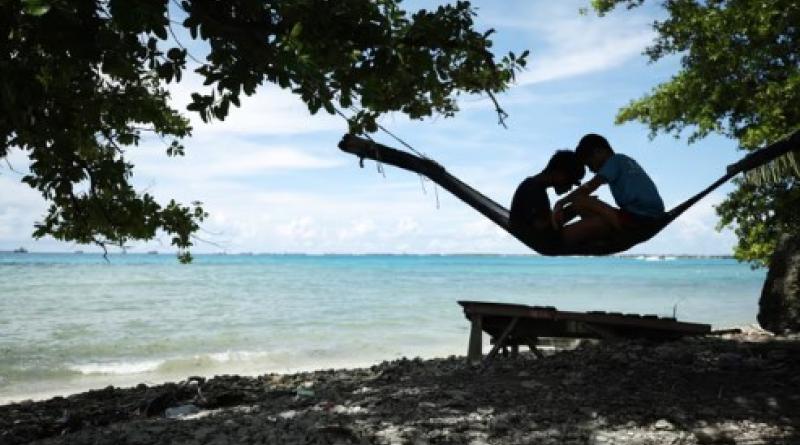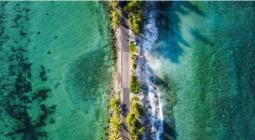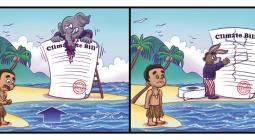‘Not conducive to our survival’: Pacific islands on the climate frontline respond to Cop28 deal

“We are now swimming against the tide and trying our best to survive,” Lavenia Naivalu told Cop28 this month.
Speaking on an Indigenous panel representing the Pacific, the iTaukei woman from the island of Yasawa in Fiji told the annual climate conference that rising sea levels and flash flooding are “a real threat” to daily life in her country. Last month alone two flash floods in Fiji’s central and eastern divisions caused landslides and blocked roads.
After years of campaigning for stronger action on climate change, small vulnerable nations like Fiji hoped Cop28 would deliver a meaningful global commitment to preventing its worst effects from wreaking havoc on their shores.
But despite a landmark consensus on loss and damage funding and fossil fuels, those on the frontline of the climate crisis are disappointed by a final agreement that does little to grapple with the reality of a rapidly warming world.
‘The space has been compromised’
On 30 November, the opening day of the conference, a historic loss and damage fund was established to help developing nations alleviate the impacts of climate change. Two weeks later, the leaders of almost 200 countries agreed on a climate deal calling on all nations to transition away from fossils fuels.
The president of Cop28, Sultan Al Jaber, was celebrated for shepherding through the commitments. However, Drue Slatter, a Pacific climate campaigner and communications manager for 350.org, says much of the credit is due to small island countries, who have laid the groundwork by fighting for vulnerable nations over many years.
And although these were significant wins, many Pacific campaigners and negotiators say the deal does not go anywhere near far enough.
Cop summits, which are defined by a series of negotiations and renegotiations of texts introduced or already agreed upon at previous conferences, can be hard to penetrate at the best of times, Slatter says.
Despite the solidarity among Pacific island nations who relayed messages to negotiators to hold the line, Cop28 was particularly difficult, hosted as it was by the United Arab Emirates, a fossil fuel producing nation, and attended by a record number of fossil fuel lobbyists.
As Cop28 wore on, negotiations heated up around the language of the commitment: would the world work to “phase out” or “phase down” fossil fuels? Eventually the wording was watered down to “transition away”.
“It is not conducive to our survival,” Slatter says. “The fact that Cop28 has 2,456 lobbyists means that the space has been compromised – and the final outcome provides loopholes that benefit the fossil fuel industry.
“As long as we allow these perpetrators into the UNFCCC process we are only going to see incremental change, we are not going to see transformative change.”
The Alliance of Small Island States (Aosis) was active in the negotiations at Cop28, “working hard to coordinate the 39 small island developing states that are disproportionally affected by climate change”. But in a moment of almost tragic symbolism, Aosis said it was absent from the room when the decision on the global stocktake text was gavelled.
The global stocktake is a process that occurs every five years to collectively assess the world’s progress on climate action, identifying where countries are falling short to inform future plans. It ultimately guides policymakers and stakeholders towards stronger commitments to meet the goals of the Paris climate agreement.
In a statement read out after the stockate text was decided, Aosis said that it contained “many good elements” but “the course correction that is needed has not yet been secured”.
“We have made an incremental advancement over business as usual when what we really needed is an exponential step-change in our actions and support,” Aosis said.
“In paragraph 26, we do not see any commitment or even an invitation for parties to peak emissions by 2025. We refer to the science throughout the text, but then we refrain from an agreement to take the relevant action in order to act in line with what the science says we have to do.”
The alliance raised a number of other concerns, including paragraphs on abatement that could be perceived in a way that underwrites further fossil fuel expansion, and a “litany of loopholes” that do not deliver on subsidy phase-out and do not “advance us beyond the status quo”.
‘We cannot afford to fail’
On the final day of the conference, the UN chief, António Guterres, delivered a message to those who opposed the “phase out” of fossil fuels in the final text: “I want to say that a fossil fuel phase out is inevitable, whether they like it or not.
“Let’s hope it doesn’t come too late.”
In the Pacific it is already too late. The impacts of climate change are happening now, with cyclones, droughts and rising sea levels compromising people’s basic human rights.
In the negotiating room at Cop28, the Pacific team experienced strong pushback from big emitter countries, but punched above their weight in efforts to get the world to understand that this is a matter of survival for their island nations.
“We cannot afford to return to our islands with the message that this process has failed us,” Aosis said in a statement.
Henry Puna, the secretary general of the Pacific Islands Forum, said: “If the world had heeded our call 10 or 20 years ago, we wouldn’t be in this situation where we are contemplating scenarios that require us to abandon our homes, our ancestral lands, and our way of life as we know it.”
James Bhagwan, the secretary general of the Pacific Conference of Churches and a strong advocate for climate justice, was on the ground at Cop28 providing support to negotiators and activists. He said it was now important for friends of the Pacific to show support.
Bhagwan fondly recalled his November meeting with Australia’s environment minister, Chris Bowen, in Canberra, saying: “It was good to hear some of the projects that Australia is working on domestically in their transition.”
But he said the recent announcement that Australia cannot completely phase out fossil fuels was concerning, especially considering its desire to co-host Cop31 alongside the Pacific.
“We have got to see some significant shifts,” he said. “In order to support an Australia-Pacific Cop, our Pacific needs a win.”
Bhagwan issued a challenge to politicians to “be willing to sacrifice their political future for the sake of the entire planet and the Pacific people”.
The Pacific may be disappointed with the final result of Cop28, but it is still grateful for incremental progress and holds out hope that more practical transitions will take place.
“Our lived experience tells us we are running out of time, and the way most of these Cops end up tells us we are running out of time,” Bhagwan said.
“We are coming away from these meetings too often now where our leaders and our negotiators are in tears because their hard work gets watered down at the last minute.
“We need those who say they are on our side to be on our side now.”






